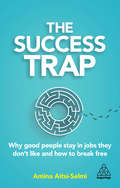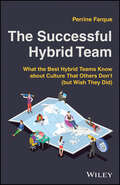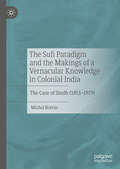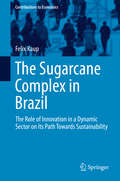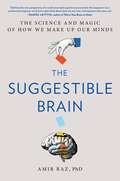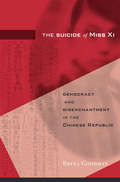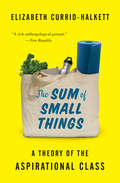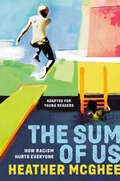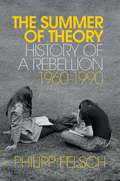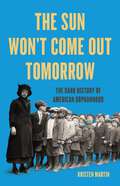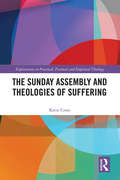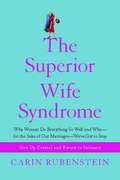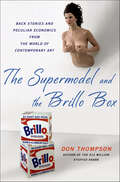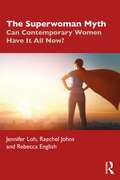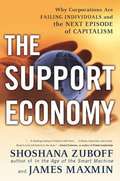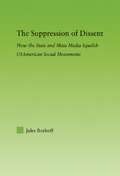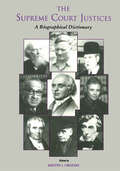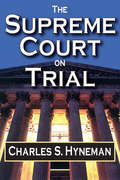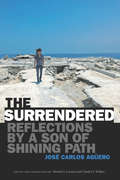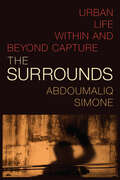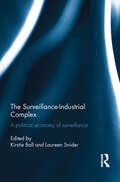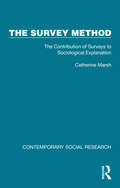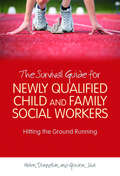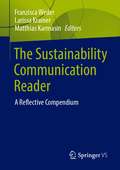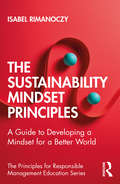- Table View
- List View
The Success Trap: Why Good People Stay in Jobs They Don’t Like and How to Break Free
by Dr Amina Aitsi-SelmiDo you feel trapped in a toxic work culture? Or stuck in a job you're great at... but that you don't actually like? Why do good people stay in bad jobs for so long? The Success Trap answers all these questions - and shows you what to do about it. An estimated 80% of individuals in the western workforce want to change job - if you're one of them, then this book will enable you to understand why, help you reconnect with what's really important to you, and provide practical tips and tools to empower you to take control of your own career. Written by specialist coach and consultant Dr Amina Aitsi-Selmi, this book builds on her years of experience as a physician, in healthcare policy, and coaching and consulting with hundreds of individuals and organizations. Combining her personal expertise with scientific research - including Google's Project Aristotle and the Global Happiness Council's Workplace Wellbeing report - it provides insights and useful takeaways you can use in your own work life. Don't stay stuck in a job you hate - let this book help you escape The Success Trap.
The Successful Hybrid Team: What the Best Hybrid Teams Know About Culture that Others Don't (But Wish They Did)
by Perrine FarqueProven strategies to build, nurture, and retain world-class talent in a hybrid environment In The Successful Hybrid Team: What the Best Hybrid Teams Know About Culture that Others Don&’t (But Wish They Did), award-winning diversity and inclusion expert Perrine Farque delivers an eye-opening look into what distinguishes world-class teams from the also-rans. The book explores the permanent changes being made in the modern workplace, how hybrid work is fundamentally changing the nature of teams, and the overwhelming importance of culture in determining performance. The author introduces a four-pillar framework that details what you need to do to hire, lead, and retain a high-performing team in a hybrid world. You&’ll discover how to create a unified hybrid leadership team, how to build extreme clarity and transparency, how to overcommunicate through digital channels, and how to unify cross-cultural remote teams with cultural awareness. The book also offers: A deep dive into topics like how and why meetings are important, and how to best leverage them in a hybrid environment Descriptions of the most common pitfalls experienced by those leading hybrid teams and how to avoid them Useful tips, resources, and checklists that supplement the four-pillar framework discussed in the bookA can&’t-miss resource for executives, managers, and other business leaders who find themselves dealing with the new reality of hybrid and remote work, The Successful Hybrid Team will also earn a place in the libraries of human resources and DEI professionals, remote workers, and anyone else who regularly interacts with colleagues, direct reports, or supervisors in a hybrid environment.
The Sufi Paradigm and the Makings of a Vernacular Knowledge in Colonial India: The Case of Sindh (1851–1929)
by Michel BoivinThis book demonstrates how a local elite built upon colonial knowledge to produce a vernacular knowledge that maintained the older legacy of a pluralistic Sufism. As the British reprinted a Sufi work, Shah Abd al-Latif Bhittai's Shah jo risalo, in an effort to teach British officers Sindhi, the local intelligentsia, particularly driven by a Hindu caste of professional scribes (the Amils), seized on the moment to promote a transformation from traditional and popular Sufism (the tasawuf) to a Sufi culture (Sufiyani saqafat). Using modern tools, such as the printing press, and borrowing European vocabulary and ideology, such as Theosophical Society, the intelligentsia used Sufism as an idiomatic matrix that functioned to incorporate difference and a multitude of devotional traditions—Sufi, non-Sufi, and non-Muslim—into a complex, metaphysical spirituality that transcended the nation-state and filled the intellectual, spiritual, and emotional voids of postmodernity.
The Sugarcane Complex in Brazil
by Felix KaupThis book offers an in-depth analysis of the Brazilian sugarcane complex with a special focus on technological advances that promote sustainable development. It first examines the question why sugarcane-based ethanol from Brazil is considered a superior alternative to fossil fuel compared to other biofuels produced on an industrial scale and subsequently analyzes the most dynamic areas within the sugarcane sector with regard to relevant actors, technologies and markets in order to determine if the sector can be considered an innovation system. The empirical research presented here is based on multiple research methods and derives its data from interviews with Brazilian experts of the sugarcane sector and by a thorough literature review. The book will be of special interest to researchers and practitioners interested in understanding the key mechanisms in successful innovation systems that promote a transition towards sustainable development and mobility.
The Suggestible Brain: The Science and Magic of How We Make Up Our Minds
by Amir RazNeuroscientist Amir Raz shares decades of research and case studies to show how suggestion changes the brain and shapes our behavior—and how we can protect ourselves from and harness suggestibility in our own lives. Suggestions can make cheap wine taste like Château Margaux, warp our perception of time, and alter our memories—and in an age where disinformation has impacted our personal lives and our politics, the power of suggestion is worth even more attention. In The Suggestible Brain, world-renowned expert on the science of suggestion Amir Raz, PhD, brings together cognitive aspects of psychology, sociology, and anthropology with issues in our contemporary culture, media, alongside a series of case studies of patients with disorders ranging from Tourette&’s Syndrome to false pregnancies, lactose intolerance, and asthma to show exactly how suggestions can cut deep into our brains, shake our fundamental knowledge, and override our core human values. Some questions include: Why do placebos work even when people know they are inactive pills—and why do red pills cause stress whereas blue pills feel calm? Can suggestions effectively treat depression and anxiety? How do people weaponize suggestion in the form of gaslighting and mental abuse? Why are we more likely to believe fake news that already aligns with our political beliefs? How can suggestions help fight racism, hatred, and bigotry? Conversely, how can suggestions backfire and create the opposite effect? Merging Dr. Raz&’s experiences as a magician and hypnotist with decades&’ worth of his own neuropsychological research, The Suggestible Brain maps the twilight zone where magic and science coalesce, and shows how easily suggestible and manipulable we all are. Readers will walk away with actionable advice on how to harness the science of suggestion to propel change, protect against manipulative misinformation, and better regulate our internal, mental universe.&“Professor Amir Raz is a consummate scientist and former professional magician. His scientific research and writing have made substantial contributions to our understanding of hypnosis, placebo effects, and suggestion. His book will amaze and entertain you, while at the same time being firmly rooted in the scientific data. It is a magical book.&”--Irving Kirsch, PhD, author of The Emperor&’s New Drugs: Exploding the Antidepressant Myth"[This book] could have been titled This is Your Brain on Magic. Told from the twin perspectives of a world-renowned cognitive neuroscientist who happens to be a professional magician, you&’ll never again think about what you see, hear, and experience the same way.&”—Daniel Levitan, author of This is Your Brain on Music
The Suicide of Miss Xi: Democracy and Disenchantment in the Chinese Republic
by Bryna GoodmanA suicide scandal in Shanghai reveals the social fault lines of democratic visions in China’s troubled Republic in the early 1920s. On September 8, 1922, the body of Xi Shangzhen was found hanging in the Shanghai newspaper office where she worked. Although her death took place outside of Chinese jurisdiction, her US–educated employer, the social activist Tang Jiezhi, was kidnapped by Chinese authorities and put on trial. As scandal rocked the city, novelists, filmmakers, suffragists, reformers, and even a founding member of the Chinese Communist Party seized upon the case as emblematic of deeper social problems. Xi’s family claimed that Tang had pressured her to be his concubine; his conviction instead for financial fraud only stirred further controversy. The creation of a republic ten years earlier had unleashed a powerful vision of popular sovereignty and a view of citizenship founded upon science, equality, and family reform. But, Bryna Goodman shows, after the suppression of the first Chinese parliament, efforts at urban liberal democracy dissolved in a flash of speculative finance and the suicide of an educated, working “new woman.” In yet another blow, Tang’s trial exposed the frailty of legal mechanisms in a political landscape fragmented by warlords and enclaves of foreign colonial rule. The Suicide of Miss Xi opens a window onto how urban Chinese in the first part of the twentieth century navigated China’s early passage through democratic populism, in an ill-fated moment of possibility between empire and party dictatorship. Xi Shangzhen became a symbol of the failures of the Chinese Republic as well as the broken promises of citizen’s rights, gender equality, and financial prosperity betokened by liberal democracy and capitalism.
The Sum of Small Things: A Theory of the Aspirational Class
by Elizabeth Currid-HalkettHow the leisure class has been replaced by a new elite, and how their consumer habits affect us allIn today’s world, the leisure class has been replaced by a new elite. Highly educated and defined by cultural capital rather than income bracket, these individuals earnestly buy organic, carry NPR tote bags, and breast-feed their babies. They care about discreet, inconspicuous consumption—like eating free-range chicken and heirloom tomatoes, wearing organic cotton shirts and TOMS shoes, and listening to the Serial podcast. They use their purchasing power to hire nannies and housekeepers, to cultivate their children’s growth, and to practice yoga and Pilates. In The Sum of Small Things, Elizabeth Currid-Halkett dubs this segment of society “the aspirational class” and discusses how, through deft decisions about education, health, parenting, and retirement, the aspirational class reproduces wealth and upward mobility, deepening the ever-wider class divide. Exploring the rise of the aspirational class, Currid-Halkett considers how much has changed since the 1899 publication of Thorstein Veblen’s Theory of the Leisure Class. In that inflammatory classic, which coined the phrase “conspicuous consumption,” Veblen described upper-class frivolities: men who used walking sticks for show, and women who bought silver flatware despite the effectiveness of cheaper aluminum utensils. Now, Currid-Halkett argues, the power of material goods as symbols of social position has diminished due to their accessibility. As a result, the aspirational class has altered its consumer habits away from overt materialism to more subtle expenditures that reveal status and knowledge. And these transformations influence how we all make choices. With a rich narrative and extensive interviews and research, The Sum of Small Things illustrates how cultural capital leads to lifestyle shifts and what this forecasts, not just for the aspirational class but for everyone.
The Sum of Us (Adapted for Young Readers): How Racism Hurts Everyone
by Heather McGheeThe New York Times bestseller, now adapted for a new generation of young readers, leaders, thinkers, and activists. A groundbreaking call to action that examines how racism affects and harms all of us and how we need to face it head-on, together.The future can be prosperous for everyone, but only if we address the problems of racial and economic inequality.McGhee believes that all people, of all ages and all backgrounds, need to rethink their attitude toward race and strive together to create opportunities that benefit everyone. This book is a call to action. McGhee examines how damaging racism is, not only to people of color but also to white people. She offers hope and real solutions so we can all prosper. An expert in economic policy, McGhee draws lessons both from her work at a think tank and from her travels around the country talking to everyday Americans fighting for a more just and inclusive society.The people she meets prove how the stories we tell ourselves about race and belonging influence the policies that determine our shared economic future.The Sum of Us provides hope that with understanding and open-mindedness, the world can be more united and equitable than it is today.
The Summer of Theory: History of a Rebellion, 1960-1990
by Philipp Felsch‘Theory’ – a magical glow has emanated from this word since the sixties. Theory was more than just a succession of ideas: it was an article of faith, a claim to truth, a lifestyle. It spread among its adherents in cheap paperbacks and triggered heated debates in seminar rooms and cafés. The Frankfurt School, Structuralism, Post-Structuralism, Adorno, Derrida, Foucault: these and others were the exotic schools and thinkers whose ideas were being devoured by young minds. But where did the fascination for dangerous thoughts come from? In his magnificently written book, Philipp Felsch follows the hopes and dreams of a generation that entered the jungle of difficult texts. His setting is West Germany in the decades from the 1960s to the 1990s: in a world frozen in the Cold War, movement only came from big ideas. It was the time of apocalyptic master thinkers, upsetting reading experiences and glamorous incomprehensibility. As the German publisher Suhrkamp published Adorno’s Minima Moralia and other High Theory works of the Frankfurt School, a small publisher in West Berlin, Merve Verlag, provided readers with a steady stream of the subversive new theory coming out of France. By following the adventures of the publishers who provided the books and the reading communities that consumed and debated them, Philipp Felsch tells the remarkable story of an intellectual revolt when the German Left fell in love with Theory.
The Sun Won't Come Out Tomorrow: The Dark History of American Orphanhood
by Kristen MartinThe real history of being an orphan in America is nothing like the myth, and nothing like the American dream. The orphan story has been mythologized: Step one: While a child is still too young to form distinct memories of them, their parents die in an untimely fashion. Step two: Orphan acquires caretakers who amplify the world&’s cruelty. Step three: Orphan escapes and goes on an adventure, encountering the world&’s vast possibilities. The Sun Won't Come Out Tomorrow upends this. Pairing powerful critiques of popular orphan narratives, from Annie to the Boxcar Children to Party of Five, journalist Kristen Martin explores the real history of orphanhood in the United States, from the 1800s to the present. Martin reveals the mission of religious indoctrination that was at the core of the first orphanages, the orphan trains that took parentless children out West (often without a choice), and the inherent classism and racism that still underlies the United States' approach to child welfare. Through a combination of in-depth archival research, memoir (Martin herself lost both her parents when she was quite young), and cultural analysis, The Sun Won't Come out Tomorrow is a compellingly argued, compassionate book that forces us to reconsider autonomy, family, and community. Kristen Martin delivers a searing indictment of America's consistent inability to care for those who need it most.
The Sunday Assembly and Theologies of Suffering (Explorations in Practical, Pastoral and Empirical Theology)
by Katie CrossThis book draws on a study of the Sunday Assembly- a "godless congregation"- to reflect on how the Church might better deal with suffering, lament and theodicy. Against a backdrop of a shifting attitudes towards religion, humans are now better connected than ever before. It is no exaggeration to suggest that we carry the suffering of the world in our pockets. In the midst of these intersecting issues, the Sunday Assembly provides insight into how meaning-making in times of trauma and crisis is changing. Drawing on practical theology and using ethnographic tools of investigation, this book includes findings from interviews and observation with the Sunday Assembly in London and Edinburgh. It explores the Sunday Assembly’s philosophy of "celebrating life," and what this means in practice. At times, this emphasis on celebration can result in situations where suffering is "passed over," or only briefly acknowledged. In response, this book considers a similar tendency within white Protestant churches to avoid explicit discussion of difficult issues. This book challenges churches to consider how they might resist the avoidance of suffering through the practice of lament.The insights provided by this book will be of particular interest to scholars of Religious Studies, Practical Theology, Secularism and Atheism/Non-religion.
The Superior Wife Syndrome
by Carin Rubenstein"My husband is in charge of dinner only on Friday night. And every single Friday night, he calls me and says, 'What do you want me to order for dinner?'"-- Toni Sound familiar? You are not alone! This book can help you and your marriage! As women have risen in the work world, their marriages have been transformed, too. The wife has become the superior spouse; she is responsible for managing every aspect of the family's life, from financing the mortgage to picking what the kids wear to school. This book is for every wife who wonders why she's in charge of everything, while her husband lounges on the couch and watches the game. The Superior Wife Syndrome explains how she ended up like this and reveals how she can let go of her superiority and work her way back to marital equality. Bringing together personal stories of everyday couples and expert social analysis, psychologist Carin Rubenstein provides readers with an intelligent and groundbreaking look into a disturbing marital trend: In two out of three marriages, women are running the show while men take it easy. As a result, more and more women are rejecting marriage as a viable social institution. The Superior Wife Syndrome provides a look into the heart of modern marriage, as it reveals and explores: Six signs of superiority: from being the multitasker to being the decider. Top twenty-six topics wives nag their husbands about, from A to Z. Four types of modern marriage, from Captain and Mates to Even-Stevens. Top ten sex wishes of husbands and wives. Twenty-one ways to fix a superior wife marriage. Filled with personal stories and packed with tips for breaking the pattern,The Superior Wife Syndrome gives women the tools they need to step down from their thrones, reconnect with their husbands, and have happier and healthier marriages.
The Supermodel and the Brillo Box: Back Stories and Peculiar Economics from the World of Contemporary Art
by Don ThompsonAcquiring contemporary art is about passion and lust, but it is also about branding, about the back story that comes with the art, about the relationship of money and status, and, sometimes, about celebrity. The Supermodel and the Brillo Box follows Don Thompson's 2008 bestseller The $12 Million Stuffed Shark and offers a further journey of discovery into what the Crash of 2008 did to the art market and the changing methods that the major auction houses and dealerships have implemented since then. It describes what happened to that market after the economic implosion following the collapse of Lehman Brothers and offers insights and art-world tales from dealers, auction houses, and former executives of each, from New York and London to Abu Dhabi and Beijing. It begins with the story of a wax, trophy-style, nude upper-body sculpture of supermodel Stephanie Seymour by Italian artist Maurizio Cattelan, which sold for $2.4 million to New York über-collector and private dealer Jose Mugrabi, and recounts the story of a wooden Brillo box that sold for $722,500. The Supermodel and the Brillo Box looks at the increasing dominance of Christie's, Sotheby's, and a few über dealers; the hundreds of millions of new museums coming up in cities like Dubai, Abu Dhabi, and Beijing; the growing importance of the digital art world; and the shrinking role of the mainstream gallery.
The Superwoman Myth: Can Contemporary Women Have It All Now?
by Raechel Johns Jennifer Loh Rebecca EnglishThe book begins by raising a thoughtful question, "Can women have it all, family, work and everything in between?" If yes, then are women ‘superwomen’? More importantly, what or who is a ‘superwoman’? In other words, this book discusses the role of contemporary women in today’s modern career world and its myriad of challenges, and in turn explores the nuanced role of millennial women and provides insights into how women juggle demands at home and at work; family and career management. Using case studies from interviews with two hundred women, the authors draw on data from women themselves to explore how they navigate their daily lives to achieve work-life balance. This book will motivate readers to reframe their roles at home and in the workplace and hopefully help them reclaim control in their career/family journeys. This book is also an essential guide to thought leadership for women in leadership positions or aspiring to be in leadership positions. Finally, this book will demystify gender roles in the workplace and at home, enabling women of all ages and backgrounds to embark on their career with confidence. This book will motivate younger women who are embarking on their first career and looking to develop the inner leadership that helps them thrive in life.
The Support Economy: Why Corporations Are Failing Individuals and the Next Episode of Capitalism
by Shoshana Zuboff James MaxminToday's "managerial" capitalism has grown hopelessly out of touch with the people it should be serving. The Support Economy explores the chasm between people and corporations and reveals a new society of individuals who seek relationships of advocacy and trust that provide support for their complex lives. Unlocking the wealth of these new markets can unleash the next great wave of wealth creation, but it requires a radically new approach--"distributed" capitalism. The Support Economy is a call to action for every citizen who cares about the future. .
The Suppression of Dissent: How the State and Mass Media Squelch USAmerican Social Movements (New Approaches in Sociology)
by Jules BoykoffDespite longstanding traditions of tolerance, inclusion, and democracy in the United States, dissident citizens and social movements have experienced significant and sustained - although often subtle and difficult-to observe - suppression in this country. Using mechanism-based social-movement theory, this book explores a wide range of twentieth century episodes of contention, involving such groups as mid-century communists, the Black Panther Party, the American Indian Movement, and the modern-day globalization movement.
The Supreme Court Justices: A Biographical Dictionary (Abc-clio Supreme Court Handbooks Ser.)
by Melvin UrofskyFirst published in 1994. Routledge is an imprint of Taylor & Francis, an informa company.
The Supreme Court on Trial
by David ListokinAlthough it was written at a time of national self-criticism, The Supreme Court on Trial remains a classic examination of the place of the Supreme Court in the American political system. When originally published, the American people were engaged in a severe examination of their basic commitments, their way of life, and the direction they appeared to be going. The contemporary literature--over the air, in newspaper editorials and columns, in books and articles--was heavy with protest, admonition, and exhortation. Although the times are different, the issues raised in this volume continue to be important.The American system exalts the American citizen as common man, with claims to the dignity of citizens, and pleas for securing their civil rights. At the same time, citizens are criticized for their cultural provincialism, fear of intellectual endeavor, and adoption of conformity. Political institutions are not immune from such evaluations. We have created Hoover commissions to study the national administrative system; the Electoral College has been the subject of persistent scrutiny since World War II. There have been demands for reconstitution of our state lawmaking bodies. What links the concerns current at the time of original publication of this volume and concerns today most obviously are deep concern we now display for the character and quality of our public school curriculum and for the administrative structure which maintains and manages our schools. The role of the Supreme Court in these concerns is evident.The purpose of the book is to examine critically the place of the Supreme Court in our political system and to improve the public understanding of what the Supreme Court does, how its acts have been received, and how its way of influencing public policy is related to other methods of making public policy.
The Surrendered: Reflections by a Son of Shining Path
by José Carlos AgüeroWhen Peruvian public intellectual José Carlos Agüero was a child, the government imprisoned and executed his parents, who were members of Shining Path. In The Surrendered—originally published in Spanish in 2015 and appearing here in English for the first time—Agüero reflects on his parents' militancy and the violence and aftermath of Peru's internal armed conflict. He examines his parents' radicalization, their lives as guerrillas, and his tumultuous childhood, which was spent in fear of being captured or killed, while grappling with the complexities of public memory, ethics and responsibility, human rights, and reconciliation. Much more than a memoir, The Surrendered is a disarming and moving consideration of what forgiveness and justice might mean in the face of hate. This edition includes an editor's introduction, a timeline of the Peruvian conflict, and an extensive interview with the author.
The Surrounds: Urban Life within and beyond Capture (Theory in Forms)
by AbdouMaliq SimoneIn The Surrounds renowned urbanist AbdouMaliq Simone offers a new theorization of the interface of the urban and the political. Working at the intersection of Black studies, urban theory, and decolonial and Islamic thought, Simone centers the surrounds—those urban spaces beyond control and capture that exist as a locus of rebellion and invention. He shows that even in clearly defined city environments, whether industrial, carceral, administrative, or domestic, residents use spaces for purposes they were not designed for: schools become housing, markets turn into classrooms, tax offices transform into repair shops. The surrounds, Simone contends, are where nothing fits according to design. They are where forgotten and marginalized populations invent new relations and ways of living and being, continuously reshaping what individuals and collectives can do. Focusing less on what new worlds may come to be and more on what people are creating now, Simone shows how the surrounds are an integral part of the expansiveness of urban imagination.
The Surveillance-Industrial Complex: A Political Economy of Surveillance
by Kirstie Ball Laureen SniderToday’s ‘surveillance society’ emerged from a complex of military and corporate priorities that were nourished through the active and ‘cold’ wars that marked the twentieth century. Two massive configurations of power – state and corporate – have become the dominant players. Mass targeted surveillance deep within corporate, governmental and social structures is now both normal and legitimate. The Surveillance-Industrial Complex examines the intersections of capital and the neo-liberal state in promoting the emergence and growth of the surveillance society. The chapters in this volume, written by internationally-known surveillance scholars from a number of disciplines, trace the connections between the massive multinational conglomerates that manufacture, distribute and promote technologies of ‘surveillance’, and the institutions of social control and civil society. In three parts, this collection investigates: how the surveillance-industrial complex spans international boundaries through the workings of global capital and its interaction with agencies of the state surveillance as an organizational control process, perpetuating the interests and voices of certain actors and weakening or silencing others how local political economies shape the deployment and distribution of the massive interactions of global capital/military that comprise surveillance systems today. This volume will be useful for students and scholars of sociology, management, business, criminology, geography and international studies.
The Survey Method: The Contribution of Surveys to Sociological Explanation (Contemporary Social Research)
by Catherine MarshIn the early 1980s, the survey was the most widely used method of social research, but it had been the object of much damaging criticism. Critics maintained that there were philosophical flaws inherent in survey practice which made it unacceptable as valid method; sociology students were taught that surveys are ‘positivist’ and that alternatives should be sought wherever possible. In The Survey Method, originally published in 1982, Catherine Marsh examines such claims and shows that much of this criticism was ill-founded.The book shows that surveys do not have to be mere superficial glimpses of the surface features of processes, fact-gathering exercises or opinion polls. Properly designed, executed and analysed, they can actually provide the kind of evidence that social theorists, concerned with uncovering dynamic aspects of social life, will want to use. Catherine Marsh challenges the contention that different research procedures automatically have to commit those who use them either to a particular theory of knowledge, a view of human nature or even a political stance.The Survey Method is neither a pure defence of surveys nor a textbook on how to do them. It does, after all, criticise the kinds of surveys that are often done, and it is particularly hostile to some new and manipulative developments in the often anti-democratic use made of survey results and opinion polls. Catherine Marsh’s aim is to contribute to the methodological debate on survey research. Although the book will find most of its readers among academic sociologists, it also contains a wealth of detail on the history of surveys and an extensive annotated bibliography of the major survey literature. It will accordingly prove essential reading for practising social researchers while re-establishing the credentials of survey research amongst the broader social science community.
The Survival Guide for Newly Qualified Child and Family Social Workers
by Helen Donnellan Gordon Jackxx
The Sustainability Communication Reader: A Reflective Compendium
by Larissa Krainer Matthias Karmasin Franzisca WederThe Textbook seeks for an innovative approach to Sustainability Communication as transdisciplinary area of research. Following the United Nations Sustainable Development Goals, which are intended to transform the world as it is known, we seek for a multidisciplinary discussion of the role communication plays in realizing these goals. With complementing theoretical approaches and concepts, the book offers various perspectives on communication practices and strategies on an individual, organizational, institutional, as well as public level that contribute, enable (or hinder) sustainable development. Presented case studies show methodological as well as issue specific challenges in sustainability communication. Therefore, the book introduces and promotes innovative methods for this specific area of research.
The Sustainability Mindset Principles: A Guide to Developing a Mindset for a Better World (The Principles for Responsible Management Education Series)
by Isabel RimanoczyAs we increase our awareness of the planetary challenges and how they intersect with the discipline or profession we choose to focus on, we have put our attention on the external forces and impacts. What remains untouched however is the set of beliefs, values, assumptions, mental processes, and paradigms that we hold and share: our mindset. But how do we change a mindset? This book is the first to introduce the 12 Principles for a Sustainability Mindset, presenting educators with a framework that makes it easy to include them into teaching plans and lessons of any discipline. Written in a very clear and practical way, the book provides examples, checklists, tips, and tools for professionals and educators. It transforms the development of a much-needed mindset for sustainability into an accessible, fun and intuitive task. The book is written with educators from a variety of disciplines in mind, including but not limited to management educators, coaches, and trainers. No other book comes close to providing such a well-organized and solid way of starting to shift our mindsets in the direction of sustainability.
